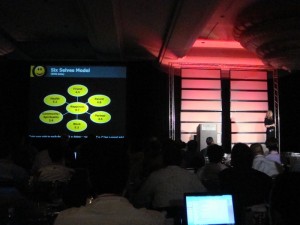And now for #3 (I paused for a few days over the holidays), Jennifer Aaker at the Business of Software Conference, 2009. Jennifer is a Stanford professor who researches what happiness really is and how we can achieve it. She gives the middle finger to opinions and has a ton of data to back up her thoughts, which is what I found the most interesting.
 Immediately, after I got back from the conference I asked myself two questions Jennifer recommended.
Immediately, after I got back from the conference I asked myself two questions Jennifer recommended.
What is the ratio of I’s to We’s? Frequent use of I indicates individuals that don’t connect with the company. We is the opposite. It usually means someone has a sense of teamwork and connectedness.
What is the ratio of positive to negative comments? 5 positives for every 1 negative is the goal we should shoot for in an organization. The closer to 1-to-1 a organization gets, the more disengaged your employees are likely to be.
While great organizations strive to have happy employees, there is always going to be part of the job that employees don’t like. Things that drain and unmotivate them. These questions help to expose parts of the job that detract from employees experiences.
Jennifer had a few tips to try and improve our happiness throughout each day.
Time setting - Block off time for certain activities. During that time, protect yourself from email, phones, twitter, etc.
Reward system - We all need to have personal reward systems. By breaking down the day into smaller microchunks, setting goals, and then rewarding ourselves with activites like a reading break, starbucks, workout, or massage, we can more readily deal with the stress of everyday life.
Emotional buffering - Certain parts of a job are never fun. When these depleting tasks come up, pair them with uplifting activities. One idea she had was do reviews at Starbucks instead of at the office.
Team rewards - These are how we get to We
 One of the more surprising pieces of information she showed was what doesn’t make people happy. Money, promotions, and religion have little to no effect, and can have a negative effect on happiness. Events like winning the lottery can temporarily improve your mental state, but even after a few days that mental state returns to normal levels. Life changing events like paralysis work the same way. A few months after an accident, victims usually return to the same level of happiness as before the accident.
One of the more surprising pieces of information she showed was what doesn’t make people happy. Money, promotions, and religion have little to no effect, and can have a negative effect on happiness. Events like winning the lottery can temporarily improve your mental state, but even after a few days that mental state returns to normal levels. Life changing events like paralysis work the same way. A few months after an accident, victims usually return to the same level of happiness as before the accident.
This is just the tip of the iceberg on Jennifer’s talk. If you want to learn more, you can check our her many research papers.